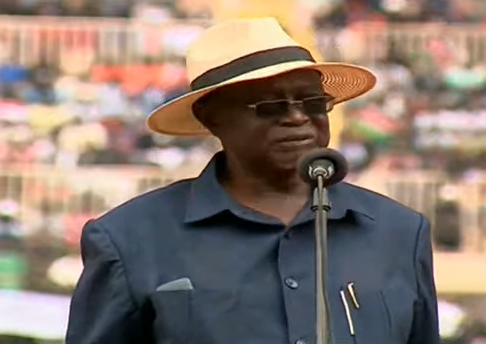

Siaya Senator Oburu Odinga has
revealed that his younger brother and former Prime Minister Raila Odinga was a
good cook, and would always emerge the first in class during their school days.
Speaking at Nyayo National Stadium
on Friday, a field filled with mourners, dignitaries, and foreign guests, Oburu
painted an intimate portrait of a man many knew as a political giant, but few
had seen through the lens of a brother.
His words brought to life the
warmth, discipline, and determination that shaped Raila long before politics
did.
“He was a good cook. And he was always number one in class,” he said.
“He was more than a brother. He was my
advisor and confidant. He was everything.”
In his moving tribute, Oburu
revealed the significance of the sad day that his brother passed away.
“Unfortunately, he passed on my
birthday. October 15, 1943,” he said.
The audience fell silent for a
moment, sharing in the personal pain of a brother whose life has been
intertwined with Raila’s since childhood.
Oburu went on to recall their
upbringing under their parents, Jaramogi Oginga Odinga and Mama Mary
Odinga, describing their mother as “a disciplinarian more than our father.”
“Our grandmother told us, ‘You my
boys are also my girls,’” he said.
“We had to learn how to fetch firewood,
cook, and prepare everything, including washing clothes and ironing. Raila was
best in all of those things.”
The crowd erupted, laughter mixing
with admiration.
“The other thing Raila was best at
was in class,” Oburu continued.
“I was average. I could be number
five, four, or three sometimes. But Raila was always number one.”
Turning to lighter memories, Oburu
recalled their youthful days as sportsmen.
“Raila was also a sportsman,” he said.
“He used to triple jump, play football, and do pole vault. But I was
better than him in jumping and pole vault!”
The crowd burst into laughter again,
grateful for the levity amid the solemnity.
“My brother loved justice from the beginning,”
he said.
“He loved to hear news. One day, he
was late to school, and when the teacher asked why, he said, ‘I was still
listening to the radio. I wanted to hear the news.’ And he was only in Standard
Four.”
“Raila was known as a no-nonsense
man,” Oburu added, drawing nods from those who had worked with the late leader.
“He entertained no mediocrity. If
you came across him with lies or mediocrity, his left hand was very fast, he
would give you something to teach you a lesson that you must always be
truthful.”
Oburu then paused, his tone
deepening.
“He protected me and my late brother Agolla,” Oburu continued.
“Because he was braver in confronting anyone who attacked us. I can tell you the story of Raila the whole day, but that is not my intention today. I respected him as my leader, even in the political arena.”



















